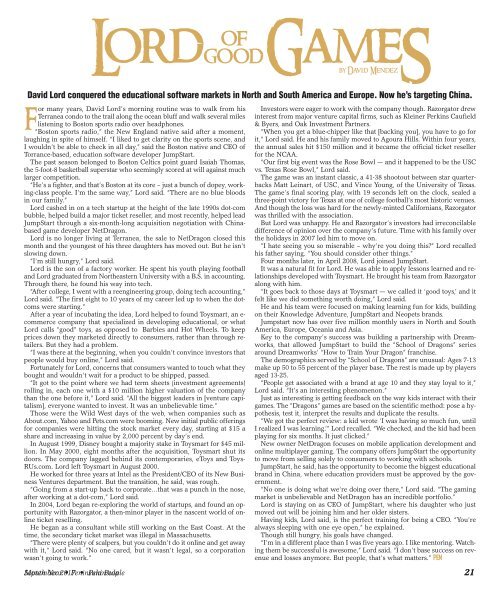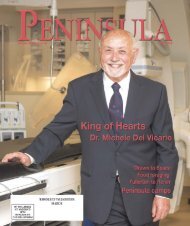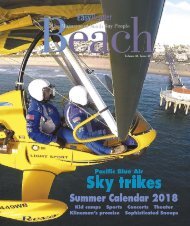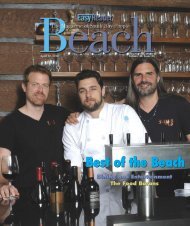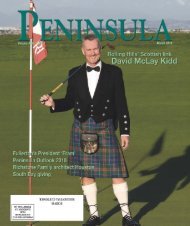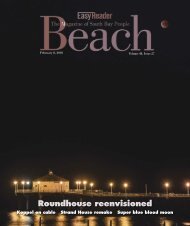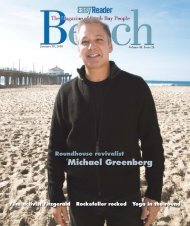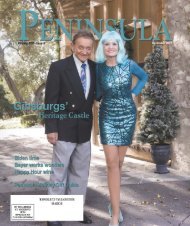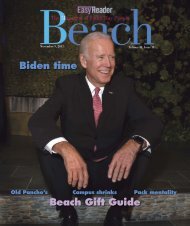Create successful ePaper yourself
Turn your PDF publications into a flip-book with our unique Google optimized e-Paper software.
Lord goodGameS<br />
of<br />
For many years, David Lord’s morning routine was to walk from his<br />
Terranea condo to the trail along the ocean bluff and walk several miles<br />
listening to Boston sports radio over headphones.<br />
“Boston sports radio,” the New England native said after a moment,<br />
laughing in spite of himself. “I liked to get clarity on the sports scene, and<br />
I wouldn’t be able to check in all day,” said the Boston native and CEO of<br />
Torrance-based, education software developer JumpStart.<br />
The past season belonged to Boston Celtics point guard Isaiah Thomas,<br />
the 5-foot-8 basketball superstar who seemingly scored at will against much<br />
larger competition.<br />
“He’s a fighter, and that’s Boston at its core – just a bunch of dopey, working-class<br />
people. I’m the same way,” Lord said. “There are no blue bloods<br />
in our family.”<br />
Lord cashed in on a tech startup at the height of the late 1990s dot-com<br />
bubble, helped build a major ticket reseller, and most recently, helped lead<br />
JumpStart through a six-month-long acquisition negotiation with Chinabased<br />
game developer NetDragon.<br />
Lord is no longer living at Terranea, the sale to NetDragon closed this<br />
month and the youngest of his three daughters has moved out. But he isn’t<br />
slowing down.<br />
“I’m still hungry,” Lord said.<br />
Lord is the son of a factory worker. He spent his youth playing football<br />
and Lord graduated from Northeastern University with a B.S. in accounting.<br />
Through there, he found his way into tech.<br />
“After college, I went with a reengineering group, doing tech accounting,”<br />
Lord said. “The first eight to 10 years of my career led up to when the dotcoms<br />
were starting.”<br />
After a year of incubating the idea, Lord helped to found Toysmart, an e-<br />
commerce company that specialized in developing educational, or what<br />
Lord calls “good” toys, as opposed to Barbies and Hot Wheels. To keep<br />
prices down they marketed directly to consumers, rather than through retailers.<br />
But they had a problem.<br />
“I was there at the beginning, when you couldn’t convince investors that<br />
people would buy online,” Lord said.<br />
Fortunately for Lord, concerns that consumers wanted to touch what they<br />
bought and wouldn’t wait for a product to be shipped, passed.<br />
“It got to the point where we had term sheets (investment agreements)<br />
rolling in, each one with a $10 million higher valuation of the company<br />
than the one before it,” Lord said. “All the biggest leaders in [venture capitalism],<br />
everyone wanted to invest. It was an unbelievable time.”<br />
Those were the Wild West days of the web, when companies such as<br />
About.com, Yahoo and Pets.com were booming. New initial public offerings<br />
for companies were hitting the stock market every day, starting at $15 a<br />
share and increasing in value by 2,000 percent by day’s end.<br />
In August 1999, Disney bought a majority stake in Toysmart for $45 million.<br />
In May 2000, eight months after the acquisition, Toysmart shut its<br />
doors. The company lagged behind its contemporaries, eToys and Toys-<br />
RUs.com. Lord left Toysmart in August 2000.<br />
He worked for three years at Intel as the President/CEO of its New Business<br />
Ventures department. But the transition, he said, was rough.<br />
“Going from a start-up back to corporate…that was a punch in the nose,<br />
after working at a dot-com,” Lord said.<br />
In 2004, Lord began re-exploring the world of startups, and found an opportunity<br />
with Razorgator, a then-minor player in the nascent world of online<br />
ticket reselling.<br />
He began as a consultant while still working on the East Coast. At the<br />
time, the secondary ticket market was illegal in Massachusetts.<br />
“There were plenty of scalpers, but you couldn’t do it online and get away<br />
with it,” Lord said. “No one cared, but it wasn’t legal, so a corporation<br />
wasn’t going to work.”<br />
by David Mendez<br />
David Lord conquered the educational software markets in North and South America and Europe. Now he’s targeting China.<br />
Investors were eager to work with the company though. Razorgator drew<br />
interest from major venture capital firms, such as Kleiner Perkins Caufield<br />
& Byers, and Oak Investment Partners.<br />
“When you get a blue-chipper like that [backing you], you have to go for<br />
it,” Lord said. He and his family moved to Agoura Hills. Within four years,<br />
the annual sales hit $150 million and it became the official ticket reseller<br />
for the NCAA.<br />
“Our first big event was the Rose Bowl — and it happened to be the USC<br />
vs. Texas Rose Bowl,” Lord said.<br />
The game was an instant classic, a 41-38 shootout between star quarterbacks<br />
Matt Leinart, of USC, and Vince Young, of the University of Texas.<br />
The game’s final scoring play, with 19 seconds left on the clock, sealed a<br />
three-point victory for Texas at one of college football’s most historic venues.<br />
And though the loss was hard for the newly-minted Californians, Razorgator<br />
was thrilled with the association.<br />
But Lord was unhappy. He and Razorgator’s investors had irreconcilable<br />
difference of opinion over the company’s future. Time with his family over<br />
the holidays in 2007 led him to move on.<br />
“I hate seeing you so miserable – why’re you doing this?” Lord recalled<br />
his father saying. “You should consider other things.”<br />
Four months later, in April 2008, Lord joined JumpStart.<br />
It was a natural fit for Lord. He was able to apply lessons learned and relationships<br />
developed with Toysmart. He brought his team from Razorgator<br />
along with him.<br />
“It goes back to those days at Toysmart — we called it ‘good toys,’ and it<br />
felt like we did something worth doing,” Lord said.<br />
He and his team were focused on making learning fun for kids, building<br />
on their Knowledge Adventure, JumpStart and Neopets brands.<br />
Jumpstart now has over five million monthly users in North and South<br />
America, Europe, Oceania and Asia.<br />
Key to the company’s success was building a partnership with Dreamworks,<br />
that allowed JumpStart to build the “School of Dragons” series<br />
around Dreamworks’ “How to Train Your Dragon” franchise.<br />
The demographics served by “School of Dragons” are unusual: Ages 7-13<br />
make up 50 to 55 percent of the player base. The rest is made up by players<br />
aged 13-25.<br />
“<strong>People</strong> get associated with a brand at age 10 and they stay loyal to it,”<br />
Lord said. “It’s an interesting phenomenon.”<br />
Just as interesting is getting feedback on the way kids interact with their<br />
games. The “Dragons” games are based on the scientific method: pose a hypothesis,<br />
test it, interpret the results and duplicate the results.<br />
“We got the perfect review: a kid wrote ‘I was having so much fun, until<br />
I realized I was learning.’” Lord recalled. “We checked, and the kid had been<br />
playing for six months. It just clicked.”<br />
New owner NetDragon focuses on mobile application development and<br />
online multiplayer gaming. The company offers JumpStart the opportunity<br />
to move from selling solely to consumers to working with schools.<br />
JumpStart, he said, has the opportunity to become the biggest educational<br />
brand in China, where education providers must be approved by the government.<br />
“No one is doing what we’re doing over there,” Lord said. “The gaming<br />
market is unbelievable and NetDragon has an incredible portfolio.”<br />
Lord is staying on as CEO of JumpStart, where his daughter who just<br />
moved out will be joining him and her older sisters.<br />
Having kids, Lord said, is the perfect training for being a CEO. “You’re<br />
always sleeping with one eye open,” he explained.<br />
Though still hungry, his goals have changed.<br />
“I’m in a different place than I was five years ago. I like mentoring. Watching<br />
them be successful is awesome,” Lord said. “I don’t base success on revenue<br />
and losses anymore. But people, that’s what matters.” PEN<br />
<strong>Sept</strong>ember Month Year <strong>2017</strong> • <strong>Peninsula</strong> • <strong>Peninsula</strong> <strong>People</strong> 21


